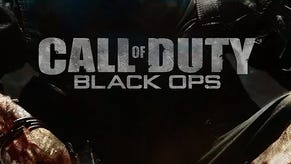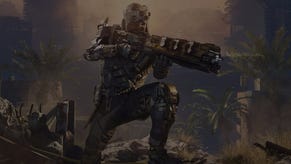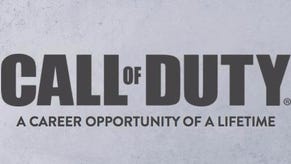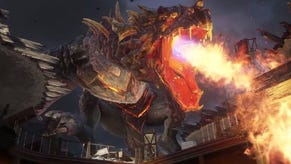Call of Duty: Black Ops 3 is a world at war with itself
Treyarch's next generation debut is a chronically uneven, cleverly conflicted shooter.
Editor's note: This is an early impressions piece, based upon a review event where we were able to play through Black Op 3's campaign. We'll have our full review, which will take into consideration the multiplayer and a weekend spent playing Black Ops 3 on live servers, early next week.
Call of Duty has finally gone mad. Years of upping the ante, of packing ever more gadgetry and grandeur into what is still largely the same linear shooter, have strained it to the point that even central characters are losing their bearings. "Can you remember where we are, Hendricks?" mutters Call of Duty: Black Ops 3's lead as I wander around one of the new pre-mission briefing chambers - social and customisation hubs, lurid with ambient flourishes such as holographic displays plus the odd aimless bloke with a mop, that squat somewhere between Destiny's Tower and the interrogation chamber of the original Call of Duty: Black Ops. We are, it transpires, in Singapore. A few seconds later, I sit opposite Hendricks in the belly of a VTOL as he chomps on a chocolate bar. Hendricks loves chocolate. He says there's nothing quite like it. But as our radio handler archly points out, thanks to our assorted bio-augmentations anything can be made to taste of chocolate. Food for thought, right? About the objectivity of chocolate? Not for long.
Another few seconds later we're standing on the rumpled tarmac of an abandoned coastal district, and Hendricks is enthusing about what a "lawless s***hole" the place is, because it means there's no need to exercise restraint. About two minutes after that, we look on as a civilian couple are roped together by gangsters in swish faceted armour, equipped with an exploding collar and summarily decapitated. There's a bit of vengeful gunplay, then Hendricks hands me a micro-missile launcher so I can bring down a sturdy "Overlord" cyborg - an aggressive and annoying foe, best tackled in co-op or using one of your own cybernetic abilities. Then he passes me a fancy grapple of some description, and we make our way across storm-tossed terrain, ramming anchors into the ground when prompted to weather high winds and tidal surges. Then we're on a cargo ship, because there's a terminal that needs to be hacked. Then the ship is ripped in half.
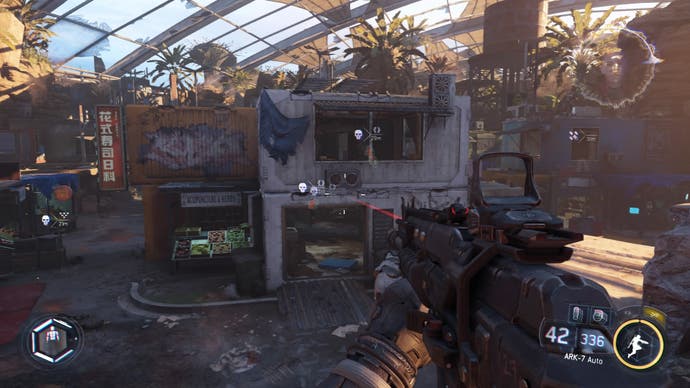
Violent leaps in tone from sentimental through pseudo-profound to gung-ho. Missions that are pinned together by the introduction and discarding of various flavours of murder-gizmo. Plots that ricochet from one environmental cataclysm to the next. Casual brutality in cutscenes to establish the local goons as irredeemable from the off. Call of Duty was ever thus, but Black Ops 3 is something more - and less. In certain respects this is the worst Call of Duty campaign I've played. The first chapter in particular is dreadful, a cavalcade of design cliches - hold-button-to-continue-plot, on-rails turret getaways - that are bashed together with all the deftness of a toddler wielding a pair of cymbals, made "memorable" only by the opportunity to spectate via CCTV on acts of torture.
The plot and dialogue are at times so awful as to put Team America: World Police to shame. This is a game in which fat-jawed loons bellow things like "YOU SOLD ME OUT", in which conspiracy spreads "like a cancer" and the CIA is exposed for the billionth time over as Skynet in a square suit. And while the layouts are, as I'll discuss, much larger and more receptive to improvisation, the same old story-mandated checkpoints and bottlenecks recur. As with Battlefield, there are "leaving mission area" warnings to keep you on the straight and narrow in supposedly open areas. Chapters are much longer than in previous Call of Duty campaigns, which suits the co-op focus and allows for more sustained environmental storytelling - there's a well-crafted specimen early on, in which you descend through an old subterranean robots lab to a nicely staged if rudimentary boss fight, only for a bunch of good-for-nothings to flood the facility as you head for the exit. But accommodating a four-player headcount throughout also leads to more of that infamous gating, where you're forced to wait for your AI escort to catch up and undertake some pointless dramatic skit before opening the way ahead.
This reached a peak of idiocy for me during an assault on a Egyptian drilling platform following an aerial bombing sequence, when I left my comrade far behind only for my character to yell at him to slow down - a clash between script and player the game sheepishly resolved by teleporting him in front of me. In a subsequent chapter, the same character warns you with a straight face that "you're going down a path I can't follow". Thank goodness for that. Moments of borderline self-commentary like this suggest that Treyarch is as weary of Call of Duty's quirks and foibles as anyone - a suspicion that intensifies towards the end of the game, when the storyline flips over into something altogether more self-referential and disturbed.
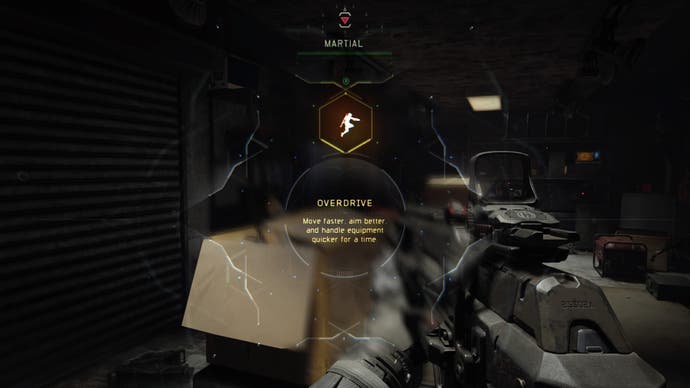
This transition is Black Ops 3's salvation as a single player experience, and it happens care of yet another piece of sexy near-future technology: your suite of cybernetic abilities and perks, which don't so much build on as digest and rearrange the capabilities of Call of Duty: Advanced's exosuit. The immediate consequence is a refreshingly strong focus on customisation and flexibility in firefights. There are three "cybercore" ability trees, Martial, Chaos and Control, which are unlocked with the same level-up tokens you'll use to buy and accessorise guns and gear.
Martial is for lone wolves and skirmishers - the options there range from speed buffs and active camo to a satisfying bodyslam move and a ground-pound. Chaos is for acts of sabotage. It sees you dispatching nanobots to shred or at least preoccupy nearby targets, overloading drones (robots in close proximity to the victim also detonate, so there's a pleasing element of timing), and setting off every incendiary object in view. Control, finally, is all about hacking robots and piloting them remotely. It's a juicy if hardly exotic set of supporting powers, and you're encouraged to switch up your approach frequently, picking new cybercores at the mobile armouries that are sprinkled throughout each chapter.
The fundamentals of movement have also been rejigged. Advanced Warfare's rocket-jump returns as a perk: you can now extend it by holding the button till you run out of juice, a nod to Destiny's graceful aerial showboating. Boost-dodging is out, a change that's decisive in multiplayer, where there's slightly less risk of being cheaply outmaneuvered in a close quarters duel. Multiplayer is also where you'll most appreciate wall-running: it and the double-jump are optional abilities in the campaign, and while there are some giddy flanking routes to discover, it's rarely as pressing a battlefield gambit as, say, tossing a foe's grenade back into their foxhole. In general, the aim to support a multitude of styles - invisible tank one minute, ninja hacker the next - does stop Treyarch giving each individual skill its due. But these are very worthwhile changes on the whole, and the designers build some decent scenarios around your various tricks and tactics, a fondness for bullet-sponge mech battles notwithstanding. One mission sees players pushing through a cluttered market to a shipping yard alongside a squad of ally 'bots, hurling themselves through windows and along the periphery in scenes that occasionally call to mind Far Cry in their generosity of options.
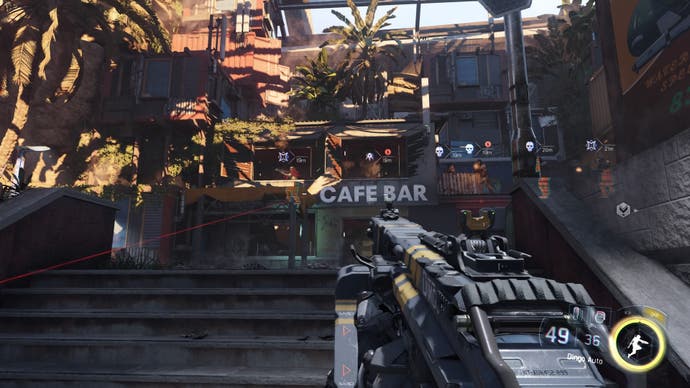
Ubisoft's influence is also palpable in the addition of a vision mode that highlights enemies and interactive objects, for speedy reading of busy encounters. It's Call of Duty belatedly doing what Hardline did for Battlefield, but there's an arresting wrinkle: the tactical view also shows you where enemies are likely to concentrate their fire as a carpet of yellow-to-red hexagons. The significance of this is quiet, but shouldn't be understated. Call of Duty is the epitome of the killzone-dependent shooter. There isn't a player on the planet, however dextrous or butter-fingered, who hasn't fallen foul of those moments when panic drowns situational analysis and the radial damage indicator lights up like the eye of Sauron. Now, we can see the killzone almost as a designer would - a physical entity, winding its way insidiously through the level. It's Call of Duty letting us in, just a little, on the puppetry that powers it.
And this is the tip of the iceberg. At the risk of giving things away, the presence of cybernetic implants facilitate a cluster of levels that are effectively Call of Duty eating itself alive from the inside out. The design, stylings and even the technical limitations of older Call of Duties are invoked as part of a self-renouncing quest for peace in a world that no longer knows why it's at war. Some of the execution is quite obvious - there are lakes of blood, and one section leans on Inception so blatantly you might overlook the nod to Call of Duty 1 - but compared to the missile countdowns and last-ditch base assaults that close out other Call of Duties, it's practically BioShock. And in any case, the spectacle of a developer grappling with its own artistic inheritance in this fashion is worth a few missteps. To hammer things home, there's a New Game+ option waiting in the wings that remixes the same levels and cutscenes with a new plot and voiceover (I won't spoil the details). Again, the implementation has its highs and lows; the point is that Treyarch is willing to leave the artificiality of Call of Duty in plain sight, by showing how the pieces can be shuffled into a different narrative context without much alteration.
Is that enough to counteract the abysmal banter, the slaps on the wrist when you stray off the path, the twiddling of thumbs while some lumbering wingman hams up the business of opening a door? I suspect not. In its heart of hearts Black Ops 3 is still the shooter where you go from A to B, firing at narrowly out-of-cover scalps from a crouch, and there's only so much a developer can do to undermine the ground it's standing on. But Treyarch deserves applause for creating a story that functions as self-critique, even as it labours to escape the formula's limitations - pushing back the level boundaries, and pumping up the player's agency.
Another way of looking at the game is that it's a rewrite of Advanced Warfare - the same agility, the same chest-thumping techno-excess, but sinisterly perverted. Treyarch began its Call of Duty career as the franchise's "B-team", operating within parameters laid down by Infinity Ward, and the detachment that identity confers is, I think, crucial to the success of the Black Ops games, with their taste for framing devices and woozy period soundtracks, their fascination with psychological rupture and the relative playfulness with which they handle political and technological trends that are reverentially recounted by other instalments. It equips the designers to explore what an absurd, nihilistic exercise Call of Duty's long campaign has become. Black Ops 3's campaign isn't a clean start for the series, and nor should it be - there are no clean starts for a franchise of this stature, with billions of dollars on the line and unrelenting demand for bigger booms, louder crescendos, ever more arcane varieties of killing instrument. The best you can do is leave the chaos and despair in the open for all to see.


